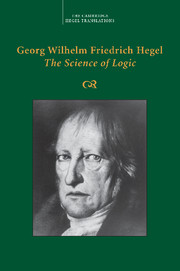Chapter 3 - Being-for-itself
Published online by Cambridge University Press: 30 September 2021
Summary
In being-for-itself, qualitative being is brought to completion; it is infinite being; the being of the beginning is void of determination; existence is sublated but only immediately sublated being; it thus contains, to begin with, only the first negation, itself immediate; being is of course retained as well, and the two are united in existence in simple unity; for this reason, however, each is in itself still unlike the other, and their unity is still not posited. Existence is therefore the sphere of differentiation, of dualism, the domain of finitude. Determinateness is determinateness as such; being which is relatively, not absolutely, determined. In being-for-itself, the distinction between being and determinateness, or negation, is posited and equalized. Quality, otherness, limit, as well as reality, in-itselfness, ought, and so forth, are the incomplete configurations of negation in being which are still based on the differentiation of the two. But since in finitude negation has passed over into infinity, in the posited negation of negation, negation is simple self-reference and in it, therefore, the equalization with being – absolutely determinate being.
First, being-for-itself is immediately an existent-for-itself, the one.
Second, the one passes over into a multiplicity of ones – repulsion or the otherness of the one which sublates itself into its ideality, attraction.
Third, we have the alternating determination of repulsion and attraction in which the two sink into a state of equilibrium; and quality, driven to a head in being-for-itself, passes over into quantity.
BEING-FOR-ITSELF AS SUCH
The general concept of being-for-itself has come to light. The justification for using the expression “being-for-itself” for that conceptwould depend on showing that the representation associated with the expression corresponds to the concept. So indeed it appears to do.We say that something is for itself inasmuch as it sublates otherness, sublates its connection and community with other, has rejected them by abstracting from them. The other is in it only as something sublated, as its moment; being-for-itself consists in having thus transcended limitation, its otherness; it consists in being, as this negation, the infinite turning back into itself.
- Type
- Chapter
- Information
- Georg Wilhelm Friedrich Hegel: The Science of Logic , pp. 126 - 151Publisher: Cambridge University PressPrint publication year: 2010

